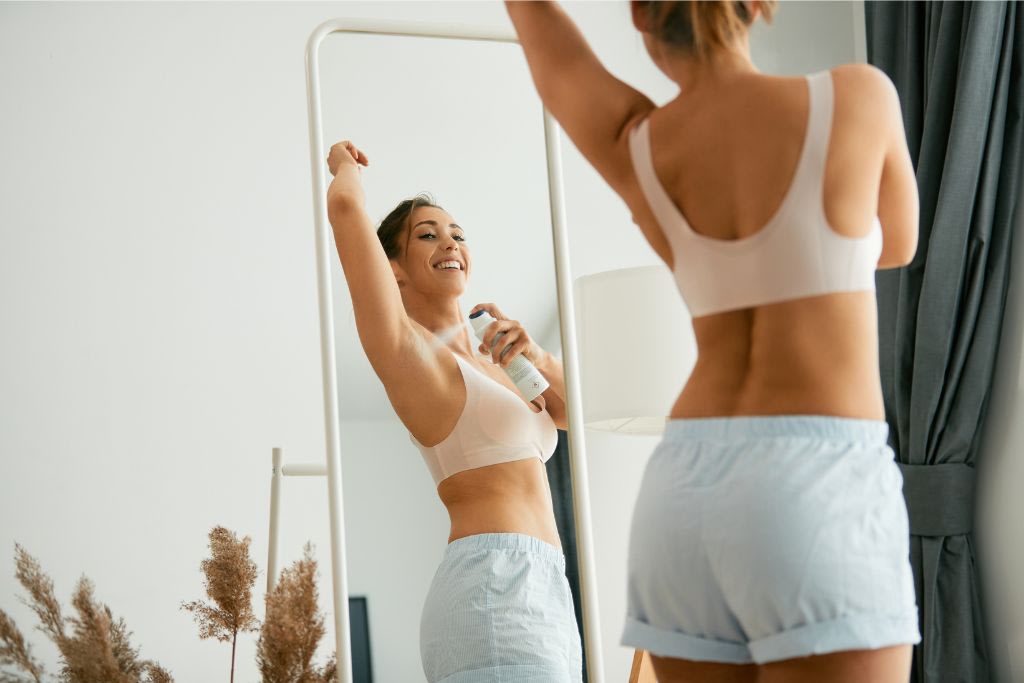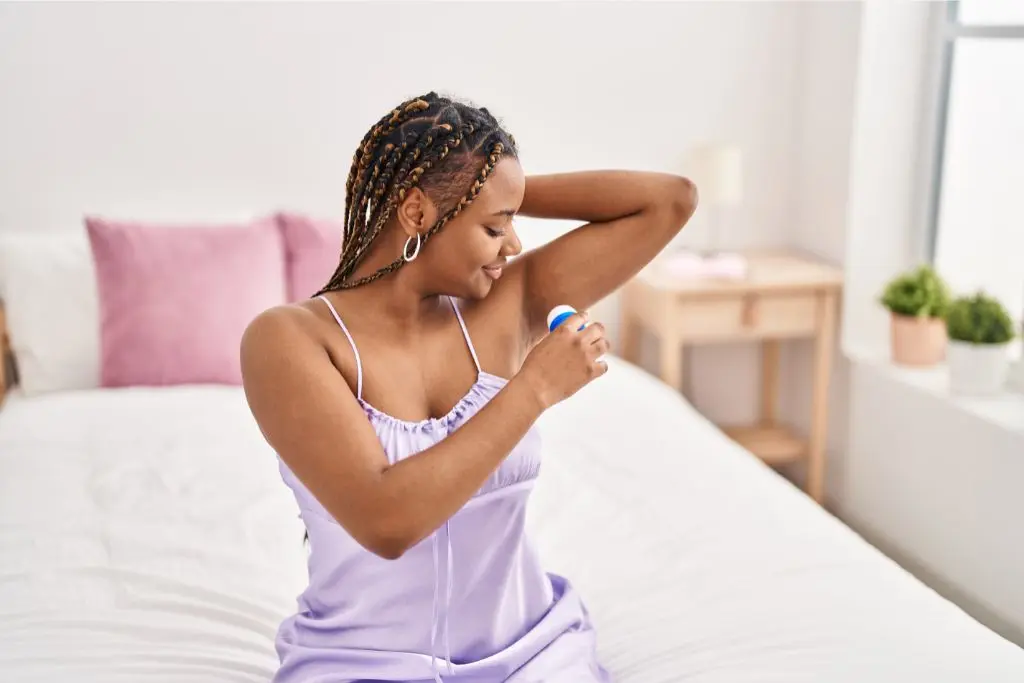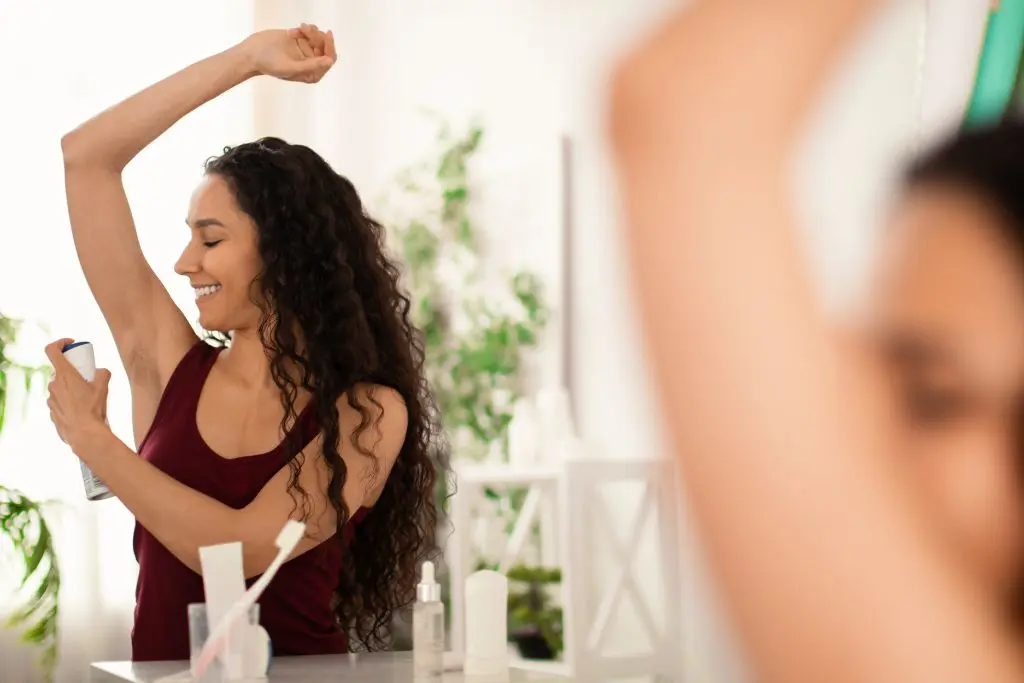Antiperspirant Vs Deodorant: What’s Best For Working Out?

February 1, 2024 - Updated February 1, 2024

We want to start by saying that sweat is a normal and natural bodily function. In fact, it’s your body’s very clever mechanism for keeping you cool and regulating your temperature. That being said, we get it. Worrying about sweat patches or body odour is just as normal as sweating itself, and can completely throw off your workout game or your confidence during the day.
So, what’s the better choice when it comes to antiperspirant vs deodorant? Here’s everything you need to know to stay fresh during your workouts and in everyday life.
Antiperspirant vs deodorant: The main difference
The biggest difference is very simple and in the names. Antiperspirants are designed to reduce or stop you from sweating, while deodorants are only designed to reduce odour. This means they are made of different key ingredients and formulations - we’ll get to that shortly.
How does antiperspirant work?
If controlling your sweat and avoiding underarm wetness or sweat patches is the priority for you, antiperspirant is the way to go! The active ingredient is aluminum, which blocks your sweat glands and the pores on the outer layer of your skin to reduce the amount of perspiration that reaches the surface of your skin.
You can buy plenty of antiperspirants over-the-counter, including high-strength options, but if you find they still aren’t reducing your sweat, prescription options are also available and may be an option for you and your healthcare provider to consider.
If you do use an antiperspirant, just be mindful of getting it on your clothes as it can cause yellow discoloration.

How does deodorant work?
Deodorants tend to be alcohol-based and are formulated to protect against armpit odour by targeting bacteria, but they don’t protect against sweat itself. If you don’t sweat very much or aren’t bothered by it, deodorant is a great option. Likewise, there are plenty of natural deodorants on the market now if you’re a fan of natural cosmetic formulations!
Although they don’t work to block sweat glands like antiperspirants do, ingredients found in deodorants such as alcohol, fragrance and essential oils can cause skin irritation for some people. If your skin doesn’t seem too happy after using deodorant (perhaps you’re experiencing redness, rashes, stinging or itching), it may help to give alcohol or fragrance-free options a go.
Wait a second… Why does sweat smell?
If you’re suddenly confused about the connection between sweat and body odour, you might be interested to know that sweat itself actually doesn’t smell! As the Cleveland Clinic explains, the odour is what happens when your sweat mixes with the bacteria on your skin. This explains why a person can be incredibly sweaty during a workout but not smell, or need to freshen up but not be sweating much at all!
If body odour is an issue for you, make sure you’re using a deodorant or an antiperspirant deodorant combination, as well as prioritising good hygiene with regular showers, changing your clothes after exercise, using antibacterial soap, or keeping antibacterial wipes and your deodorant handy to freshen up during the day.

True or false: Is aluminum in deodorant bad?
For years there have been rumours circulating that antiperspirants can be harmful for your health due to the active ingredient aluminum. There’s a concern that these compounds can affect the estrogen receptors of breast cells and increase your risk of breast cancer. But is there any truth to it?
According to the American Cancer Society, there is very little scientific evidence and no strong studies that have been performed on people to support claims suggesting a link between breast cancer rink and antiperspirant use. Research that raised concern in the past was conducted on rabbits, and the findings are not transferable to humans.
A 2002 study on antiperspirant use and the risk of breast cancer found the risk did not increase with the use of antiperspirant or deoderant use, nor did it make a difference if you shaved your underarms with a blade razor or applied products within an hour of shaving.
This was also supported by another study from 2006 where 104 people were interviewed - 54 breast cancer cases and 50 controls - finding no association between the use of antiperspirants and the risk of breast cancer. If you’re concerned, experiencing irritation or are making a shift towards natural products - there are plenty of options available so find what best suits you!
Antiperspirant vs deodorant: Things to consider
There’s no universal best option between antiperspirant and deodorant - it all comes down to your individual preferences and body. Here are a few tips and considerations to keep in mind.
If you tend to sweat heavily in general and want to reduce moisture, go for an antiperspirant
If you only sweat heavily during your workouts, remember that this is perfectly normal and your body’s way of keeping you cool. Sweating during exercise is nothing to be embarrassed about, nor does it say anything about your fitness level, personal hygiene or how hard you’ve worked
If an over-the-counter antiperspirant doesn’t help and your sweat is bothering you, try a high-strength over-the-counter product or ask your doctor about prescriptions options
If you don’t sweat very much or sweat doesn’t bother you and you simply want to smell fresh, a deodorant is a great choice
If you have sensitive skin or are trying to avoid irritants, look for deodorant formulations without alcohol, fragrance and essential oils
If you’re primarily trying to reduce odour, personal hygiene also plays a big part as it’s not your sweat that has a funky smell but the bacteria on your skin breaking down. Use antibacterial soap, shower regularly or have antibacterial wipes in your gym bag!
Your workout clothes can also turn the sweat dial up or down. It can make a big difference to choose moisture-wicking fabrics that draw the sweat away from your skin, or natural fibres like cotton that allow your skin to breathe.
Working out can help you feel amazing, but we want you to feel your best during your workouts, too. Finding the best antiperspirant or deodorant for your body and skin can take some trial and error as formulations vary, so don’t be afraid to try something different so sweat is the last thing you’re worrying about during a workout.

Erin is a writer and editor at Sweat with years of experience in women's publishing, the fitness industry, media and tech. She's passionate about the power of movement, and you can often find her on a yoga mat, a hike, a dance floor, in the ocean or the gym.
* Disclaimer: This blog post is not intended to replace the advice of a medical professional. The above information should not be used to diagnose, treat, or prevent any disease or medical condition. Please consult your doctor before making any changes to your diet, sleep methods, daily activity, or fitness routine. Sweat assumes no responsibility for any personal injury or damage sustained by any recommendations, opinions, or advice given in this article.
Wellbeing